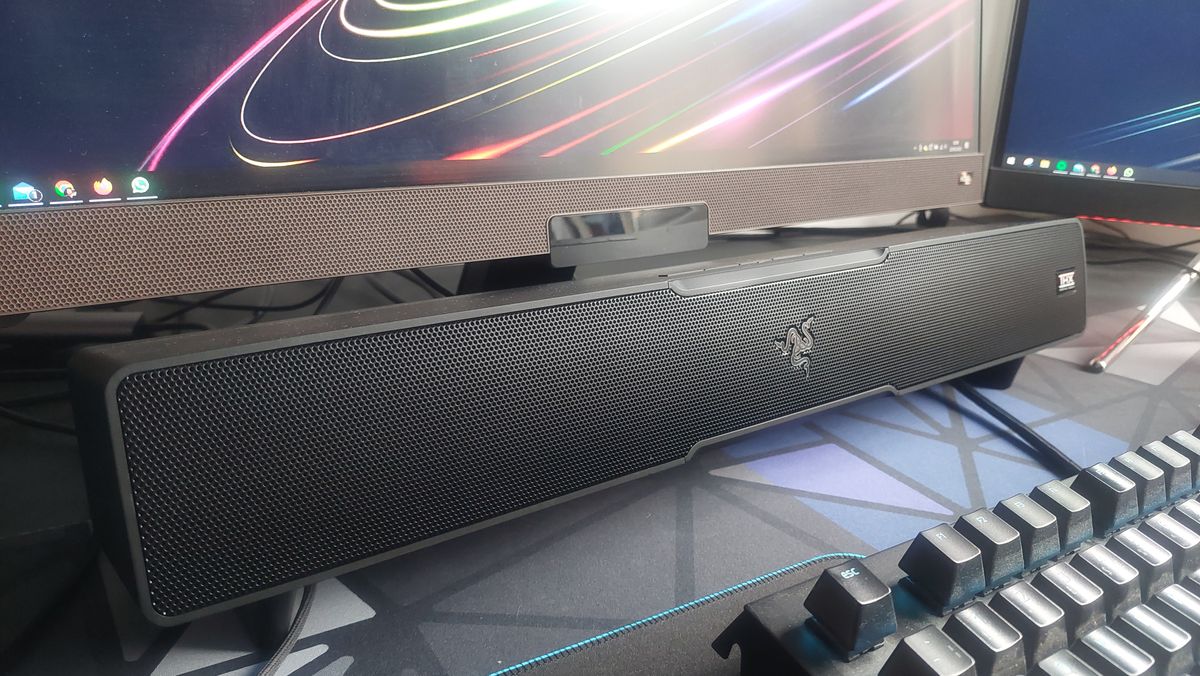12DOVE Verdict
The Razer Leviathan V2 is simultaneously a great evolution of its predecessor and a questionable one. The lack of ports and connectivity is a big shame, and the new blocky design isn't quite as chic. But the sound quality is lovely, rich, and rounded for all media, and the RGB integration and leg options make it well worth you while.
Pros
- +
Wonderful compact design
- +
Razer-quality gaming audio
- +
Plenty of speakers
Cons
- -
Compact design is also quite blocky
- -
Disappointing reduction in connectivity compared to the original
- -
The subwoofer is a little underwhelming
Why you can trust 12DOVE
Razer Leviathan V2 comes eight years or so after its predecessor, and looks to reinstate the Leviathan name as a go-to when it comes to desktop audio.
The original leviathan was quite the fan favourite for gamers both on PC and console, but the V2 version changes quite a bit. So, is it also worthy of its place among the best computer speakers when you're looking at desk-bound audio to team with a gaming PC or gaming laptop? Absolutely.
Design & Features
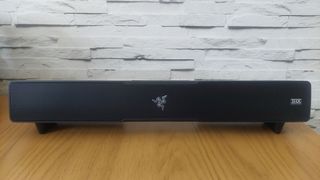
The Leviathan V2 is a chunky, blocky thing in terms of both its desktop soundbar and subwoofer. The latter is a simple black cube which is nice and compact, while the sound bar is a solid rectangle. Cramming some of that sweet, sweet Razer audio goodness into a soundbar that's only 50cm long is quite a feat.
Speakers: Soundbar: 2 x full-range drivers at 2.0 x 4.0" / 48 x 95mm; 2 x tweeters at 0.75" / 20mm; 2 x passive radiator drivers at 1.7 x 5.3" / 43 x 135mm; Subwoofer: 1 x 5.5" / 140mm
Dimensions: Soundbar: 19.7 x 3.6 x 3.3" / 500 x 91.3 x 84mm; Subwoofer: 8.67 x 8.67 x 9.5" / 220 x 220 x 241.5mm
Weight: Soundbar: 3.08lbs/1.4kg; Subwoofer: 6.61lbs/3.0kg
Connectivity: USB, Bluetooth 5.2
Frequency response: 45 Hz – 20 kHz
Price: $249.99/£229.99
Tested on PC.
What enhances the design of the sound bar is the interchangeable feet that come with the Leviathan V2. These slot in and out of the base easily and can either keep the soundbar parallel with your desk or, as I used them, point the soundbar up toward you and your, well, face. I found this a great bonus and it definitely made a difference in how I received audio - I'm not sure why other desktop speakers don't do this too really, regardless of overall sound quality. The subwoofer is a very simple one-and-done affair, and you'll not think about it again after placing it under your desk - apart from maybe to manage the cable. (A wireless subwoofer for computer speakers can't be far away, can it?)
The controls adorn the top of the soundbar and come in the form of simple, easy-to-press buttons that cover you for audio source, Bluetooth, power, and volume up and down. Nice.
The RGB I do actually find welcome in the Leviathan V2, but that is because I have a few other Razer elements in my setup, so added neatness to lighting is a boon for me. But generally, it is tastefully done. The only real problem is that (while you can adjust in Synapse, as usual) you really only get the most out of it either in the dark or dim light -it feels like it lacks a bit of flash.
Then we get to something where the design and feature set is a bit questionable but also a bit disappointing, And that is the trimming down of the ports compared to the first Leviathan. Let me describe the situation in full. First, the only physical input available on the V2 is a USB-C port. Secondly, the only other input is Bluetooth 5.2. That's it. No optical, no HDMI, no audio jack. And, in reality, even with the Bluetooth being 5.2 and more stable than ever, we wouldn't really recommend gaming over it due to the latency issues that the connection is known for. So that would leave you only the USB connection. Not nice.
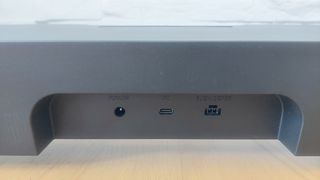
It's not only a disappointment from a choice perspective, but also from a failsafe perspective; having a simple audio jack connection to fall back on if things were to go wrong elsewhere would be a nice touch. I haven't done a teardown, of course, but it's hard to see how adding an audio jack connection, in particular, would have broken the Leviathan V2.
Meanwhile, the lack of optical connection may be explained by the new-gen consoles both ditching the connection, but it doesn't make up for it really given the other means of deploying said connection.
As a result, and away from the disappointments, this means the Leviathan V2 is clearly, and almost solely, in the realm of being PC first - perhaps even PC-only - whereas its predecessor could sit happily under a TV and utilise the old-gen consoles' optical ports.
Performance
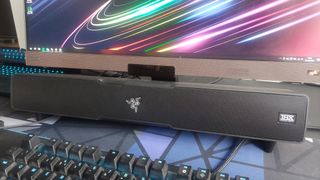
Once I was over the disappointment of the ports, broadly speaking, the audio is great. It has that same Razer pedigree that all previous Razer headsets and Razer speakers have. In terms of raw audio quality out of the box, it's good.
However, after a bit of time with it, you may, like me, notice that it sounds a bit less rounded in some scenarios. For music, podcasts, and other 'spoken voice' media, it's great and no tinkering is needed. But I did need to alter the settings through Synapse to get it right for games particularly - there was just something 'missing' otherwise.
With that out of the way though, across all my gaming it proved reliable and gave me pretty rich sound, and is boosted by that THX Spatial sound too. It worked well no matter whether I was directing units on Dawn of War III, trying to soak in the atmosphere of the Big Country in Red Dead Redemption, or trying to pinpoint enemies in frantic encounters in Apex Legends. I think for the latter in particular we'd always direct you to one of the best gaming headsets instead, but as a desktop audio solution, it will still serve you well.
As I briefly mentioned above, it was great for music which is a large part of my day's background noise so you can have confidence in its multiuse capacity.
However, the subwoofer was a bit disappointing - particularly straight out of the box - as I genuinely had to check it was functioning correctly once or twice by getting on my hands and knees. Naturally, it wouldn't have the bass capability of the Razer Nommo Pros I used previously (that has an enormous cylindrical woofer) but it would have been nice to have the Leviathan V2's woofer really clearly let me know it was there and pumping out the bottom end right after plugging it in and setting it up.
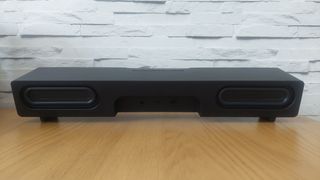
A slightly niche point about that sub-par subwoofer is that for anyone who uses a standing desk rather than a stationary gaming desk, it's really difficult to optimise. I really couldn't find a good, balanced setting for the bass that would work when both sitting and standing.
I've also recently been using the Panasonic SoundSlayer (another imminent review incoming) and this removes that problem altogether, being a fine one-and-done speaker solution with no subwoofer needed. Although it's a bit more of an investment (around $299 / £249), it has proved ideal for me and ticked that extra box - and means one fewer cables too.
Should you buy the Razer Leviathan V2?
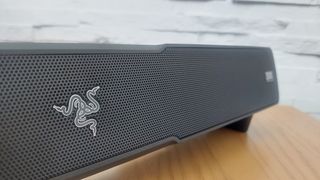
The Leviathan V2 is a good soundbar, and certainly a great contender for a PC speaker setup solution in 2022.
It sounds great with plenty of speakers offering a rounded and fulsome audio experience across pretty much all media and all genres of games. That general Razer-level audio quality and the tinkering you can do means it is a successful evolution of the first Leviathan - but not without caveats. The lack of connectivity might be seen as streamlining, but to remove all failsafes and offer not even an audio jack connection is a negative whichever way you cut it. And while the aforementioned tinkering can help optimise your sound, I consistently found that subwoofer to be a bit underwhelming.
If you can look past those, the great news is that it's also actually not bad value at all - in both the soundbar market and the speakers market. As mentioned above, though the Creative Katana V2 does sound a bit better and offers more connectivity, that is still $80 / £80 more which is the cost of a half-decent peripheral that you could reinvest. And in terms of speakers, the Razer Nommo Pro speakers might give more power and have bigger speakers and so on, but that set will still cost you double (at least) the price of the Leviathan V2.
All in, a worthy successor from the original but not without some small missteps.
How we tested the Razer Leviathan V2
The Leviathan lived on my desk for a period of a few weeks and was used for multiple hours every day for music and podcasts, and then as the primary source of my game audio for hours too.
As a result, it totally replaced my headset and became my go-to noise maker. As well as for music and work, I tested it with games like Red Dead Redemption 2, Apex Legends, Red Alert Remastered, and even when remote playing my PS5 on my PC too.
You can read more about our hardware approach to all kinds of gear that we get our hands on in our full 12DOVE Hardware Policy.
Tested on PC with a Razer Blade 15 laptop supplied by Razer and with an Acer Predator X38 monitor from Acer.
If you're looking for something to place the Leviathan V2 under then check out our best gaming monitor, best ultrawide monitor, and best curved gaming monitor guides.
Rob is the Deputy Editor of sister site, TechRadar Gaming, and has been in the games and tech industry for years. Prior to a recent stint as Gaming Editor at WePC, Rob was the Commissioning Editor for Hardware at 12DOVE, and was on the hardware team for more than four years, since its inception in late 2018. He is also a writer on games and has had work published over the last six years or so at the likes of Eurogamer, RPS, PCGN, and more. He is also a qualified landscape and garden designer, so does that in his spare time, while he is also an expert on the virtual landscapes and environments of games and loves to write about them too, including in an upcoming book on the topic!

A Minecraft Movie lands extremely positive first reactions: "A video game movie with Napoleon Dynamite DNA"

Metaphor: ReFantazio wanted to fix the JRPG grinding problem, but Atlus went too far at one point and accidentally broke the whole combat system

Final Fantasy 7 Remake and Rebirth battle director says combining everything he learned on Monster Hunter: World with Square Enix's technology and unique skills created a "chemical reaction"
